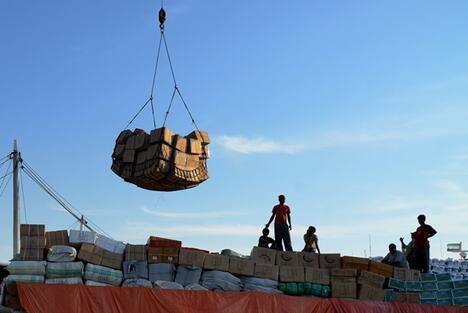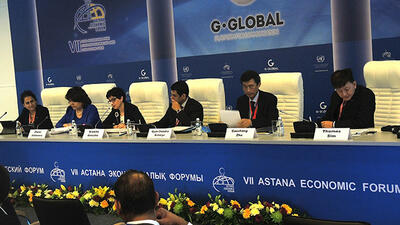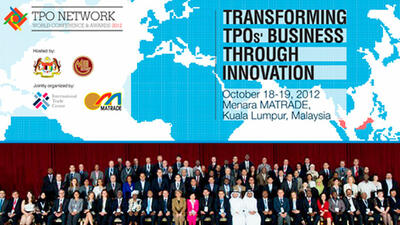Trade facilitation: Trade competitiveness and the development dimension
As early as the mid-1990s, the United Nations Conference on Trade and Development (UNCTAD) documented what later became widely acknowledged – that administrative and procedural transaction costs constitute between 3% and 6% of the value of internationally traded goods. With tariff reductions already implemented in most trading nations, in the context of multilateral and regional trade agreements, prospects for further reductions in trade transaction costs and hence increased competitiveness now rest largely upon transport and trade facilitation reforms.
Recognizing its importance for trade, UNCTAD has, for over 40 years, highlighted the development dimension of trade facilitation.
Trade facilitation reforms and development© UNCTAD/Jan Hoffmann
Trade facilitation reforms are good for development because many trade facilitation measures have a direct link to different aspects of human and institutional development. They increase the transparency of administrations and help to build trust with business sectors, they improve governance and make public resources more effective and more efficient, they strengthen capacities, increase fiscal revenues, and help to bring informal sectors into the formal economy.
The overall concept of trade facilitation encompasses the standardization, harmonization and simplification of trade procedures and documentation. Behind this general description lies an often complex combination and sequence of transformations, each of which benefits from and supports human and institutional development.
For example, if a country already has a modern financial system, it is easier to introduce customs or transit guarantee schemes that operate via the banking system. Electronic payments, and the electronic submission of information to customs, are easier to introduce if a legal and regulatory framework for electronic documents and signatures is already in place. And implementing measures such as online enquiry points or the publication of trade-related regulations on the web is far less problematic if e-governance is developed, or if the country has a high level of Internet penetration.
©UNCTAD/Jan Hoffmann
By putting in place national trade facilitation reforms supported by external financial and technical assistance, developing countries have the opportunity to modernize their international trade and transport sectors, contributing to the promotion of trade and investment promotion. At the same time, this support will also directly contribute to different development objectives. For example, investments in information and communications technologies enhance Internet connectivity between traders and government agencies, and also strengthen the private sector’s capacity to obtain and share information online. Measures currently being discussed at the World Trade Organization (WTO) that relate to consultations, appeal procedures, enquiry points and publications will improve trust and governance. The simplification of procedures and formalities will help to free up public resources, moving them away from repetitive bureaucratic tasks, in order to be able to strengthen regulatory and public planning functions.
Furthermore, there is a pro-poor human dimension in trade facilitation. The simplification of international trade procedures makes it easier for informal cross-border traders to comply with legal operations, and for small and medium-sized enterprises to start foreign trade operations. Currently, a lot of trade between neighbouring countries, particularly in Africa, is carried out by small-scale traders – frequently women or even children – whose informal trade is not recorded, and who suffer from arbitrary rules with arbitrary application at border crossings.
From a public administration perspective, trade facilitation can be a significant factor in the allocation of national resources. The simplification and standardization of procedures, fees and charges applicable to trade leads to higher and more predictable revenue collection for customs. While reforms may mean high initial investment costs, the return on investment in trade facilitation projects tends to be very high, due to the savings that result and the increased revenue collection, as the implementation of UNCTAD’s Automated System for Customs Data (ASYCUDA) has shown in many cases. Additional benefits confirming the development dimension of trade facilitation can also be observed in terms of environmental impact through more carbon-friendly transport and paperless e-government systems.
Less implementation in LDCsWhile progress can be seen in many countries, recent UNCTAD research and the extensive experience gained from UNCTAD’s technical assistance activities, including its ASYCUDA programme, shows that important challenges remain. Least developed countries (LDCs), in particular, are lagging behind in both trade facilitation reforms and international assistance received.
In general, LDCs report a lower level of trade facilitation implementation than non-LDCs (see figure). Almost two-thirds of LDCs for which UNCTAD developed national trade facilitation plans in 2012 and 2013 show less than 40% compliance with the measures currently included in the WTO negotiations. On the other hand, the majority of non-LDCs report more than 50% compliance. Unfortunately, in spite of the obvious need for technical and financial assistance in the area of trade facilitation, the share of aid assigned to trade facilitation – as compared to aid for other purposes – is lower in LDCs than in non-LDCs.
For LDCs and other vulnerable economies, trade facilitation is more difficult to implement, and yet it is even more important for such economies given the broad benefits that it brings for development.
The WTO Ministerial Conference in Bali may provide a opportunity for all countries in need of assistance to further advance their trade facilitation programmes. UNCTAD stands ready to continue supporting national policymakers, and the international community as a whole, by placing trade facilitation at the heart of public sector reforms and making it a priority for trade and development. A successful trade facilitation outcome in Bali will be the opportunity to set about forging partnerships in pursuit of that goal.










